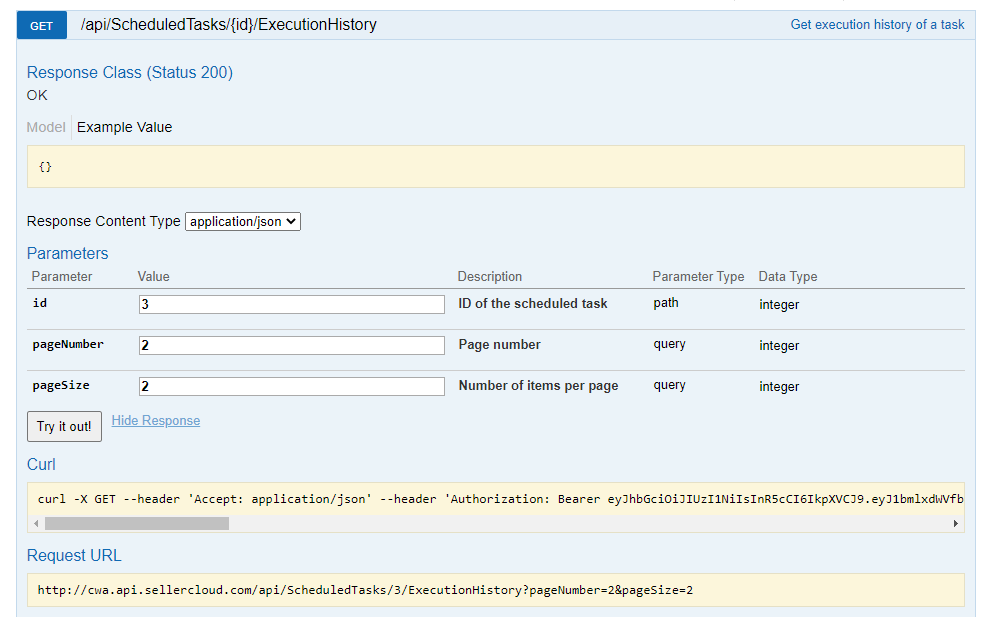Overview
In order to get information for execution history of a scheduled task, you can consume the endpoint presented in this article. In order to consume it, you must:
- Be authenticated user
For information on how you can authenticate, see: Authentication
You must also know the ID of a schedule task. This can be seen from manage scheduled tasks page in Delta UI.
Endpoint
Example for such endpoint for TT server is:
https://tt.api.sellercloud.com/rest/api/ScheduledTasks/{id}/ExecutionHistory
For your server endpoint will be:
https://{your_server_id}.api.sellercloud.com/rest/api/ScheduledTasks/{id}/ExecutionHistory
Request

- Method Type: HttpGet
- Authorization: Use Bearer Token + token received from token authentication
- Header info: Content-Type: application/json
- Parameters: ID of the existing schedule task
| Parameter | Data Type | Description | Is Required |
| id | integer | ID of existing task | Yes |
| pageNumber | integer | Page number | Yes |
| pageSize | integer | Page size | Yes |
Example:
https://tt.api.sellercloud.com/rest/api/ScheduledTasks/1/ExecutionHistory?pageNumber=1&pageSize=10
Response
- If user is authenticated and provides a valid ID of a scheduled task, then response will be Status Code 200 => OK and history metadata in JSON format
- If user is not authenticated, then response will be Status Code 401 => Not Valid Token
- On server response => Status Code 500 => Internal Server Error
Example Response
{
"Results": [
{
"ExecutedOn": "",
"JobID": 32,
"ExecutedBy": "System",
"Status": "Submitted"
"StartedOn": null,
"CompletedOn": null,
"Error": "",
"Duration": "",
"UserID": 0
}
],
"TotalResults": 1175
}
Demo in C#
static async Task Main(string[] args)
{
await GetExecutionHistory();
}
static async Task GetExecutionHistory()
{
// Valid ID of a scheduled task can be found through Delta UI
int task = 28142;
// URL for downloading execution history
string url = $"http://localhost:64158/api/ScheduledTasks/{jobID}/ExecutionHistory?pageNumber=1&pageSize=10";
// Valid token must be provided here
string token = "test token";
using (HttpClient client = new HttpClient())
{
client.DefaultRequestHeaders.Authorization =
new AuthenticationHeaderValue("Bearer", token);
HttpResponseMessage responseMessage = await client.GetAsync(url);
var content = responseMessage.Content;
}
}
public class ExecutionHistoryItem
{
public DateTime? ExecutedOn { get; set; }
public int JobID { get; set; }
public string ExecutedBy { get; set; }
public string Status { get; set; }
public DateTime? StartedOn { get; set; }
public DateTime? CompletedOn { get; set; }
public string Error { get; set; }
public string Duration { get; set; }
public string UserID { get; set; }
}
public class ExecutionHistory
{
public IEnumerable Results { get; set; }
public int TotalResults { get; set; }
}